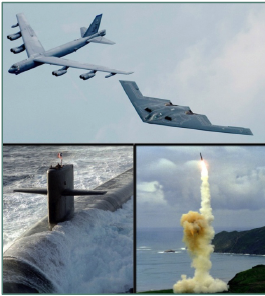The Debt Limit Deal and Nuclear Weapons Spending
The Debt Limit Deal and the Nuclear Weapons Budget - Kingston Reif in Nukes of Hazard
August 1, 2011
Featured Image
Today's top nuclear policy stories, with excerpts in bullet form.
Stories we're following today: Monday, August 1, 2011.
The Debt Limit Deal and the Nuclear Weapons Budget - Kingston Reif in Nukes of Hazard [link]
- Word is that the deal reached between the White House and Congressional leadership to raise the debt limit includes significant cuts to defense (at least $350 billion over the next decade).
- How will this impact current plans to modernize and replace U.S. nuclear delivery systems (i.e. missiles, submarines, and bombers) and U.S. nuclear warheads and their supporting infrastructure?
- It's worth recapping what senior U.S. military leaders and a Republican U.S. Senator who did not vote for the New START treaty have said in recent months about the exploding costs of nuclear modernization and the impact of likely defense cuts.
The Post-Fukushima Arms Race - Henry Sokolski in Foreign Policy [link]
- As the Fukushima accident has reduced Japan's domestic nuclear demand, it also has increased the pressures on Japanese nuclear firms to export nuclear technology.
- Reduced worldwide demand for nuclear plants is pushing nuclear firms into riskier nuclear markets in the Middle East and Asia, with potentially drastic security consequences. As past experience with India, Iran, Iraq, North Korea, and Syria demonstrates, such projects are also bomb starter kits.
- What else could help prevent countries from acquiring the material to make nuclear bombs through commercial channels? A Japanese decision to resist temptation and adopt stricter export rules would be a good start … Second, the United States needs to back these standards itself … Third, the United States and Japan should encourage others to tighten their rules on nuclear exports.
- Now, after Fukushima, we have a new opportunity to lead. We should take it.
North Korea ‘Keen’ for Six-Party Nuclear Talks - BBC [link]
- North Korea says it is eager to resume six-party talks on its nuclear programme "at an early date" and "without preconditions".
- Six-party talks involving North and South Korea, the US, Russia, China and Japan were last held in late 2008 … North Korea pulled out of the six-party talks in April 2009, shortly before carrying out a second nuclear test.
- The North Korean statement said the government was ready to fulfil commitments it signed up to in 2005 to end its nuclear programme in return for energy and economic aid.
U.S., Saudis to Discuss Nuclear Agreement - Jay Solomon in Wall Street Journal [link]
- The Obama administration plans to resume talks with Saudi Arabia about nuclear cooperation, according to senior U.S. officials, in a move aimed at boxing in Iran and keeping an eye on Riyadh's strategic ambitions.
- The U.S. and Saudi Arabia signed a tentative agreement in 2008, during the George W. Bush administration, to cooperate on developing civilian nuclear technologies, but no formal treaty has been negotiated.
- President Barack Obama signed … a deal with the United Arab Emirates in 2009 that is now viewed by the White House as a model because the U.A.E. … wouldn't be able to divert fissile materials for a nuclear-weapons program.
- In its 2008 agreement, Saudi Arabia hinted it might be willing to make commitments similar to those agreed by the U.A.E., particularly as a way to pressure Iran. Still, officials briefed on the talks said they were doubtful Riyadh would agree to the same level of restrictions.
Arms Control and Nonproliferation: The Road from Prague to Today - Ellen Tauscher [link]
- Disarmament and nonproliferation are two sides of the same coin … You cannot succeed on nonproliferation without continued progress on disarmament.
- Since the President’s Prague speech, we have made significant progress on both reducing nuclear forces and strengthening the nonproliferation regime.
- … it is in the U.S. interest and that of all other states that the 65-year record of [nuclear weapons] non-use be extended forever. The only guaranteed way to realize that goal is to eliminate nuclear weapons.
- But we cannot proceed at a glacial pace. Delay or inaction on either disarmament or nonproliferation will erode momentum until both grind to a halt.



